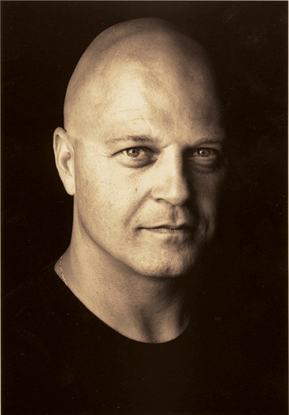BU to Hollywood: Advice from The Shield’s Tough Guy
Part two: Michael Chiklis (CFA'86) talks about the importance of trusting your own instincts

It’s hard to recall a more messed up, brutally moral, predatory hero-cop on television than Vic Mackey. Michael Chiklis created the character on The Shield, now entering its seventh and final season on FX, and it is the defining performance of his career. Some weeks, watching the show leaves you as tense and coiled as Mackey is; other weeks, you come away exhilarated, but you don’t know why, because there is little on the show to cheer about. Watching Mackey and his gang of above-the-law rogues gearing up to make a bad guy feel some pain, and feeling pumped about that, is as unsettling an experience as popular drama can offer.
Chiklis (CFA’85) knows how it is. Mackey makes him uncomfortable, too. The character so tramples the line between corruption and salvation that the line is no longer recognizable. The allure of Mackey, he says, is that his soul is still in play. “We all live in hope,” says Chiklis. “And the only thing Vic has is hope. If he loses that hope — hope in his own redemption — then there’s nothing else left for him.”
“As long as we know he’s trying to do good in some way, that he hopes for redemption, we’ll forgive him all manner of evil deeds,” Chiklis says, his familiar raspy voice surprisingly mild. “That’s what the show does — it explores the question: at what point is the hero a villain? And, in this gray time we live in, how do we combat the real evil?”
An antihero like Mackey was made for these gray times. “There’s something primal about the sense of protection he offers,” says Chiklis, who is a thoughtful observer of the character who has won him an Emmy and a Golden Globe. “I’ve had women tell me they don’t fear him, but they know that the bad guys do. He’s a protector — that’s alluring in a world where we’re being made to fear things all the time.”
Chiklis retooled his stocky frame for the role, dropping pounds and gaining muscle mass, but despite a powerful physical presence — he brings to mind a revving engine — he does most of his acting with his eyes. They glint cruelly, or flash in anger, and they can look wounded and sometimes fearful, and when they do, there’s an openness that’s utterly disarming. He says it was William Young, one of his theater professors at the College of Fine Arts, now retired, who taught him “the importance of letting your guard down. Bill and I had a conversation years after I left BU, where we talked about the fact that despite the changing landscape of this business, and even with celebrity and fame and all that, between ‘action’ and ‘cut’ you have to be open and available. You can’t afford to close yourself off.”
An actor’s working life is filled with terrible insecurity, and the advice of another BU influence, Jim Spruill, a retired CFA associate professor of acting, has gotten him through some tough days on set. “It’s all about tapping into what you have inside yourself, trusting your own instincts,” Chiklis says. “I’d love to have a conversation with Spruill now, because doing TV, this show, it’s all a trust exercise. With a film, you might do two pages a day, do a few takes of a scene. On TV, you’re plowing through it, doing nine and a half pages a day. You just read them for the first time the night before. But you can’t panic. You just do it. You handle it.”
He immerses himself so deeply in his characters that people sometimes stop remembering that he’s acting. Typecasting nearly stalled his career after The Commish, the series that made him famous in the early 1990s. He played Mackey’s better angel, a tough but honorable police commissioner — a role that was written for an older man, one that he inhabited so fully that he spent years afterward convincing directors he was not middle-aged and tubby.
Now there will be another type to escape. “Now I’m just a badass,” he says with a laugh. Mackey has brought him accolades and respect and helped him land one of the fantasy roles of his childhood, playing the Thing in the Fantastic Four movies. But Chiklis says he’ll be ready to leave Vic’s dark complexities behind. He’s even talking about trying some period work.
After seven badass years, “I’m looking up the mountain again, lacing on the climbing boots. It’s time to reinvent.”
Watch for: Michael Chiklis plays the U.S. secretary of defense in Eagle Eye, a thriller due this fall from director D. J. Caruso. The film stars Shia LaBeouf and Michelle Monaghan as a slacker and a single mom who are unwittingly caught up with a group of terrorists planning a political assassination.
Click here to read part one of “BU to Hollywood,” about screenwriter Krista Vernoff (CFA’93). Check back tomorrow to read part three of the series.
Bari Walsh can be reached at bawalsh@bu.edu.
Comments & Discussion
Boston University moderates comments to facilitate an informed, substantive, civil conversation. Abusive, profane, self-promotional, misleading, incoherent or off-topic comments will be rejected. Moderators are staffed during regular business hours (EST) and can only accept comments written in English. Statistics or facts must include a citation or a link to the citation.